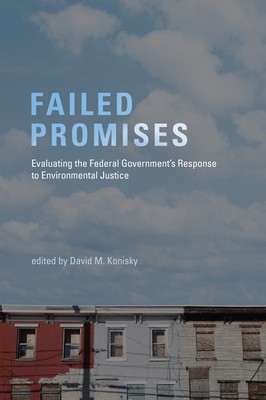
- We will send in 10–14 business days.
- Publisher: MIT Press
- ISBN-10: 0262527359
- ISBN-13: 9780262527354
- Format: 15.5 x 22.9 x 1.3 cm, softcover
- Language: English
- SAVE -10% with code: EXTRA
Failed Promises (e-book) (used book) | bookbook.eu
Reviews
Description
A systematic evaluation of the implementation of the federal government's environmental justice policies.In the 1970s and 1980s, the U.S. Congress passed a series of laws that were milestones in environmental protection, including the Clean Air Act and the Clean Water Act. But by the 1990s, it was clear that environmental benefits were not evenly distributed and that poor and minority communities bore disproportionate environmental burdens. The Clinton administration put these concerns on the environmental policy agenda, most notably with a 1994 executive order that called on federal agencies to consider environmental justice issues whenever appropriate. This volume offers the first systematic, empirically based evaluation of the effectiveness of the federal government's environmental justice policies.
The contributors consider three overlapping aspects of environmental justice: distributive justice, or the equitable distribution of environmental burdens and benefits; procedural justice, or the fairness of the decision-making process itself; and corrective justice, or the fairness of punishment and compensation. Focusing on the central role of the Environmental Protection Agency, they discuss such topics as facility permitting, rulemaking, participatory processes, bias in enforcement, and the role of the courts in redressing environmental injustices. Taken together, the contributions suggest that--despite recent environmental justice initiatives from the Obama administration--the federal government has largely failed to deliver on its promises of environmental justice.
Contributors
Dorothy M. Daley, Eileen Gauna, Elizabeth Gross, David M. Konisky, Douglas S. Noonan, Tony G. Reames, Christopher Reenock, Ronald J. Shadbegian, Paul Stretesky, Ann Wolverton
EXTRA 10 % discount with code: EXTRA
The promotion ends in 20d.23:48:36
The discount code is valid when purchasing from 10 €. Discounts do not stack.
- Publisher: MIT Press
- ISBN-10: 0262527359
- ISBN-13: 9780262527354
- Format: 15.5 x 22.9 x 1.3 cm, softcover
- Language: English English
In the 1970s and 1980s, the U.S. Congress passed a series of laws that were milestones in environmental protection, including the Clean Air Act and the Clean Water Act. But by the 1990s, it was clear that environmental benefits were not evenly distributed and that poor and minority communities bore disproportionate environmental burdens. The Clinton administration put these concerns on the environmental policy agenda, most notably with a 1994 executive order that called on federal agencies to consider environmental justice issues whenever appropriate. This volume offers the first systematic, empirically based evaluation of the effectiveness of the federal government's environmental justice policies.
The contributors consider three overlapping aspects of environmental justice: distributive justice, or the equitable distribution of environmental burdens and benefits; procedural justice, or the fairness of the decision-making process itself; and corrective justice, or the fairness of punishment and compensation. Focusing on the central role of the Environmental Protection Agency, they discuss such topics as facility permitting, rulemaking, participatory processes, bias in enforcement, and the role of the courts in redressing environmental injustices. Taken together, the contributions suggest that--despite recent environmental justice initiatives from the Obama administration--the federal government has largely failed to deliver on its promises of environmental justice.
Contributors
Dorothy M. Daley, Eileen Gauna, Elizabeth Gross, David M. Konisky, Douglas S. Noonan, Tony G. Reames, Christopher Reenock, Ronald J. Shadbegian, Paul Stretesky, Ann Wolverton


Reviews